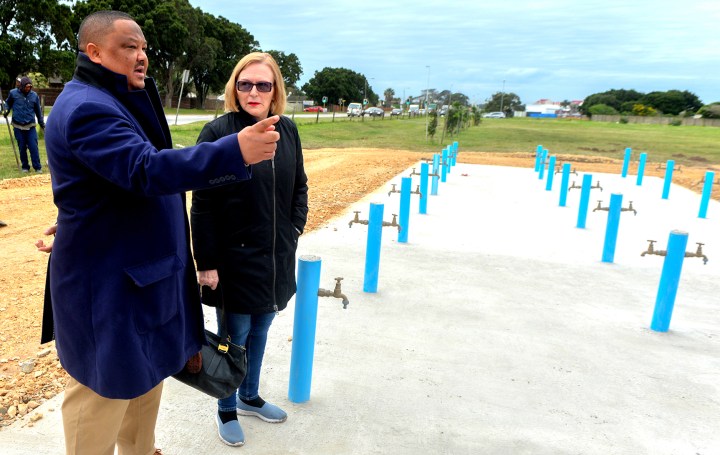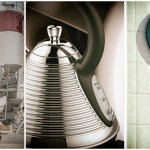COUNTDOWN TO CATASTROPHE
Is it too late for salvation? A tale of two cities as Day Zero looms

The DA’s Helen Zille lived through Cape Town’s battle to avert Day Zero in 2018. Other than heavy rain, she does not see a way for Nelson Mandela Bay to avoid water outages across 40% of the city within days.
Drought-stricken Nelson Mandela Bay (NMB) metro got some rain on Thursday, 23 June, but the water-supply outlook for the area remained dire. At that stage, there were five days worth of water left in Churchill Dam, none in Impofu Dam and 18 in the Kouga Loerie scheme — provided special permission for the city to continue over-extracting its quota could be extended.
Borehole projects started years ago are not yet operating, neither are projects to augment pump capacity in the reticulation system to get water across the whole city.
Given current consumption levels, including the 80 million litres a day being lost to leaks, if the remaining dam fails, the city will be unable to get enough water from east to west to provide for everyone.
Responding to suggestions that only a well-timed winter storm had saved Cape Town from Day Zero in 2018, DA federal council chairperson Helen Zille said: “Cape Town was never in such deep trouble. We never came within two to three weeks of running out of water. We came within a couple of months, yes. The reason why is that we spotted it a year in advance.
“Then we created a joint operational centre, bringing the spheres of government together, and we formulated a very comprehensive plan covering every portfolio. We met regularly and the plan was implemented. We never built [water collection points]. We had a plan potentially for water collection points. But we never came close to having to implement it.”
Zille was in Nelson Mandela Bay this week to inspect two water collection points that will provide emergency water to residents when Churchill Dam runs dry.
On Thursday, that dam had five days worth of water left. On Friday morning, water collection points were being set up after severe restrictions were put on further extraction from Churchill Dam.
“If you run out of water everyone will have to go to those water collection points. It is completely inadequate. The logistics behind it are impossible,” commented Zille.
“I saw two collection points today. Each with 48 taps. In a large suburb … if there is no water in that suburb, thousands of people will come and collect water. In our case, it was 25 litres per person a day. Have you ever tried to carry 50 litres of water? How are they going to manage the traffic? How are you going to get the water to your car? The logistics are impossible. I said: ‘What is your logistics plan? Where are they going to park? Are they going to book a time? Are they going to queue for the whole day?’
“It takes a while to fill up a 50-litre canister of water. Let’s say it takes everybody at least 10 minutes. You can imagine the queues, the conflict, the waiting times. People are going to start queuing at four o’clock in the morning. They may be there all night. It is just unthinkable, really.
“If the Nooitgedacht scheme had remained on schedule it would have been completed by now and given Nelson Mandela Bay a huge advantage over what Cape Town had,” said Zille.
The Nooitgedacht scheme brings water to the metro from Gariep Dam in the Free State and currently provides the metro with about 200 to 230 million litres of water a day.
The DA took over the metro in 2016 with a coalition government and, at the time, obtained a long-term loan of R750-million to ensure water security for the metro.
“If we [had] stayed in office from 2016 to now it would have been finished. It was [scheduled] in our plans that Nooitgedacht be finished in 2020.”
But the DA lost power in 2018 and the ANC took office.
“They had other priorities and much of the money earmarked for the Nooitgedacht scheme was diverted,” Zille said.
“When the DA came back into power for a brief period before the 2021 election we re-prioritised the Nooitgedacht scheme, but by then it was far too late to complete the final phase in time. I have no doubt that if we had remained in power for a full term the scheme would have been completed and there would have been no risk of Day Zero. None at all,” she said.
She said the people of Cape Town had made a huge contribution during that city’s crisis by drastically reducing consumption.
“That didn’t just happen. It happened because people were informed about the consequences of Day Zero… The city ran [an] intensive education campaign that [didn’t mince its words about] what it would be like to live without water. We were accused of causing panic. But we said whatever we are causing now will be minor to the panic when we really run out of water. People said it was bad for tourism, it was bad for investment.
“We said it may be so, but this is a crisis. It would be far worse for tourism and far worse for investment if we [ran] out of water. The people from Cape Town cut their usage by 55%. It has never happened in any city in the world before. We went down to using less water than we had 10 years previously when the population was much smaller.”
Zille explained that, as the DA had been in office for 10 years by the time the crisis hit, a lot of maintenance work had been done on the city’s reticulation system.
“We had among the lowest figures for water losses of any city in the world. Here [in Nelson Mandela Bay] they are losing millions of litres. They cannot even work out where they are losing water. In Cape Town we had the data to tell you how much people [were] using in their homes, how much in informal settlements, how much in factories, in commerce and in industries.
“We could tell you how much [was] being lost through leaks. We had sophisticated leak detection systems. Here, when I asked where this water was being lost, nobody could tell me. But the metro cannot bring down consumption and cannot avoid Day Zero. They don’t know if it is usage or if it is from leaks. If you don’t have the data, how are you going to fix it? If it is not because people are using too much but because a huge amount is running away through leaks, then it doesn’t help to tell people to save, save, save.
“You have to have data before you can plan. It is critical. They [Nelson Mandela Bay Municipality] didn’t even have that.
“It is not fair to say that just because the Nooitgedacht scheme did not reach this 40% of Nelson Mandela Bay you have to go without water completely and stand in queues while other people can get as much water as they like. It is not fair and not rational. If I was the mayor today I would introduce a water-rationing system. I would ask how do we make sure that everybody gets some water even though nobody can get water all the time,” she said.
The spokesperson for the Nelson Mandela Bay Joint Operations Centre, Luvuyo Bangazi, said water consumption was still too high in the metro to avoid Day Zero.
“At this rate, the situation becomes more dire,” he said, adding that standard operating procedures for the water points were being finalised, as “it looks likely we will need them”.
The Impofu Dam failed on 13 June after barge pumps took in mud owing to low water levels. The barge pumps are being relocated to access more water.
“We are moving with speed in fixing leaks,” said Bangazi. The city undertook to fix 3,000 leaks last week. The track record, however, shows it takes the municipality an average of 10 days to fix a leak.
It is estimated that Nelson Mandela Bay is losing about 30% of its water to leaks.
“You have to have data. Data is essential for managing a crisis. Nelson Mandela Bay metro does not appear to have that data,” said Zille. DM
This story first appeared in our weekly Daily Maverick 168 newspaper, which is available countrywide for R25.


















 Become an Insider
Become an Insider
The residents are now paying for their crazy decision to vote for the ANC despite a better, honest alternative. State failure has serious consequences and people need to think before they continue to vote for the party that has looted and wasted taxpayers money and otherwise slept on the job for at least the last 10 years. Let’s hope the Eastern Cape gets lots of rain soon, though that will no doubt cause serious flooding and destruction. I sympathise with all the innocents who didn’t cause this problem. The blame lies with foolish voters and useless ANC cadres.